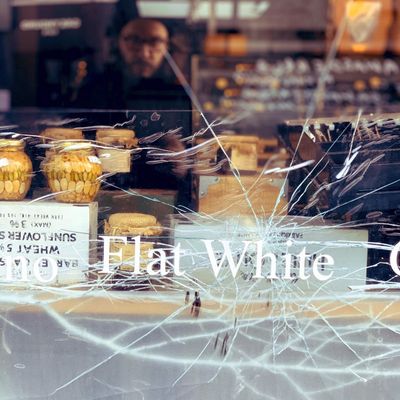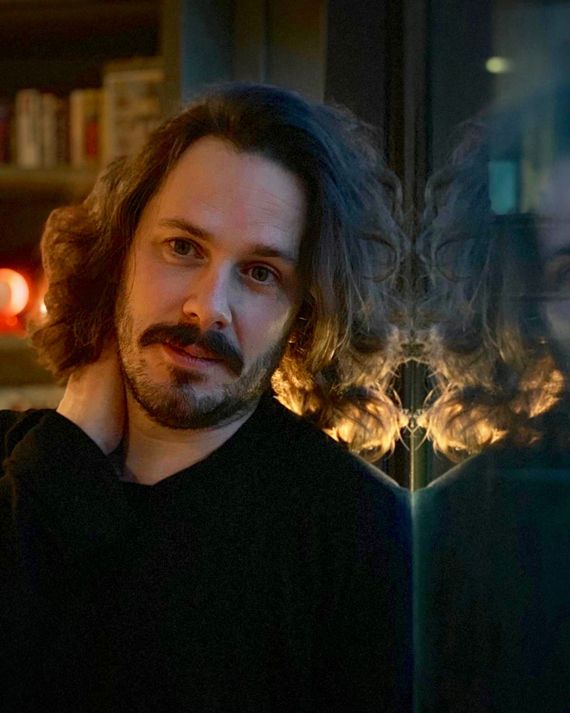
I live in the center of London, and where I am, it’s gone really dead. My only little trips are to go out and get groceries and stuff, or maybe just go for a walk. All of the bars and restaurants and cinemas and theaters are shut. Most offices are shut, with everybody working from home. At the moment it’s just the odd café with takeout only, and grocery stores that are devoid of eggs and bread and vegetables. The entire planet has suddenly got wise of the idea of vegetables being good for you. All of the ready meals are still there, and all of the chocolate is still there, but all of the vegetables have gone.
In the U.K., Boris Johnson took a very timid approach to the shutdown. Half the nation is taking it seriously, and the other half is treating it like it’s a public holiday. I’m sure it’s the same in the States, where there seems to be a lot of misinformation going around, or the idea that because you’re young that you’re not at risk. Like many other people, I have elderly relatives, and elderly people that I work with. For that reason alone, I thought, Ah, yeah, I’m going to stay in. Because the longer I stay in, the quicker it’s over. A lot of other people are not quite getting that. Some younger people are saying, “But we’re not at risk, so we’re just going to keep on partying.” I don’t know how that stops without them actually shutting down the beaches and the house parties. I suspect an even tougher shutdown is coming in the U.K.
The first things that went in a serious way were cinemas and theaters and live gigs. That happened a week before the restaurants, and bars, and pubs. For the film community, I think the first sense that this was going to be a serious thing that would have a domino effect was when the Bond movie No Time to Die pushed. People can be a bit blasé about it from a public safety level, but you always notice if some money-making exercise goes to hell. It’s a big deal for them to close Disneyland Tokyo. In a weird way, those things are good because they make people take notice.
I’m in post-production, but even in post-production, on just a liability level, we can’t ask people to come in. The entire industry is in the same boat. Every single film stopped shooting. Mission: Impossible were the first to stop shooting, and then pretty much every other film followed suit. As recently as last Monday, my director of photography, Chung Chung-hoon, was in Berlin, and was supposed to start doing a film on Monday. I asked him the Friday before, “Are you guys actually going to start on Monday?” He said, “Apparently so.” And then I texted him on Monday, “What’s happening?” He replies, “I’m on a flight back to L.A.” I read some figure that there were like 100,000 jobs lost in the film industry alone in the U.K. — not just the British film industry, there are many Hollywood films employing British crew.
I’ve been reading lots of articles online saying, “This is it, this is the end of exhibition.” So I actually started buying memberships [to cinemas], because it’s one thing you could do to help in this time, so that those cinemas could stay afloat. I do go to the cinema a lot as a paying customer, but there are places I go where I stopped to think, “Oh, am I a member of all these places?” I feel that once we’re on the other side of this, fingers crossed, people will really want to get out of the house. I don’t think that what will happen after us cocooning ourselves is people saying, “Hey, you know what? I spent six months, or 18 months, sitting at home watching different streaming services. I’m just going to keep doing that.” I feel like live music and theater and cinema might actually have a boom after this.
I have definitely been disappearing into a lot of movies. Even before the lockdown, I was spending more time at home in the evening. So I’ve gotten into the rhythm of watching things with my girlfriend, a combination of classics and films that I hadn’t seen before. I’m definitely not a doomsday prepper in terms of having important things like batteries and light bulbs and toilet rolls and food, but I feel like I’ve been doomsday prepping with Blu-rays. So even though the streaming stuff is all currently working, I’ve just been quietly going through this pile of stuff. My girlfriend is Swedish, so I’ve been watching a lot of Swedish film, which has been delightful. Some things I’m seeing again, like the films of Roy Andersson, who I adore. And I’d seen a number of Ingmar Bergman films, but I certainly hadn’t seen them all. I had that Criterion box set and had not cracked into it. So in the space of one weekend I watched Cries and Whispers, Fanny and Alexander, Shame, Scenes From a Marriage, and also the documentary Bergman: A Year in the Life. You would think that in a time of uncertainty and crisis, you would go for escapism and stuff, but I’ve found the existential dread in both Ingmar Bergman and Roy Andersson quite soothing.
I’ve also been watching quite a few British films, especially wartime or postwar ones. In the last week I’ve watched It Always Rains on Sunday, an Ealing movie, directed by Robert Hamer. It’s set in that postwar time when everything was rationed, and the people are desperate and scrambling over food and commodities and trying anything they can do to make money. I also watched Ministry of Fear, the Fritz Lang movie. I’ve seen a couple of Graham Greene things recently. I watched Went the Day Well?, directed by Cavalcanti. That one was made during the war and it’s a what-if story about if the Germans had actually invaded British soil. I watched Whistle Down the Wind and It Always Rains on Sunday in the same day, not realizing the both of them are about harboring fugitives. I don’t know why, but just by chance, you end up having these kinds of things that link together. There was one day when I did a strange double bill of Pasolini’s Theorem and then The Shout with Alan Bates — which was probably the best or the worst double bill you could watch whilst on a lot of ibuprofen. And the other day I got up at 6 in the morning and just started watching Charlie Chaplin’s The Circus. It was a lovely thing to do. I’m finding that disappearing into these movies has definitely been one way of escaping and finding some sort of inspiration in this sudden enforced hiatus.
I saw that Shaun of the Dead meme of Simon with the pint saying, “Let’s hole up at the Winchester, have a nice cold pint, and wait for this to blow over.” I would get sent that meme every day. Eventually, Simon and Nick posted a video where they basically refuted that advice because until Friday night, people were still going out to the pubs, because Boris Johnson had not closed them. People try to always invoke World War II in the U.K. “Well, in the Blitz, the Windmill Theater never closed. And we went out to the pubs.” And you want to say, “Yeah, but this isn’t the Blitz. Coronavirus isn’t going to shell us from above, we’re going to give it to each other. We are the enemy.” So Simon and Nick actually concocted a video telling people to not go to the fucking pub.
I remember the time when Simon and I were due to finish the first draft of Shaun of the Dead. We had one more thing to write. Simon couldn’t come in because he was filming something, and I said, “I’ll go into the office and I’ll write the last scene.” And the day that I was going to go in and write on my own was September 11, 2001. I remember being in this little office we had in Soho and sitting down, and then getting a text from a friend saying, “Turn on the news.”
After September 11, there was a feeling of people saying, “Oh, what does comedy mean in a time like this? We can never be funny again.” I remember for a brief moment, we thought we should abandon the script, because nobody was ever going to want to see a film about the end of the world. And then strangely, it started to feel more urgent than it ever had. So I wonder, on the other side of this, what kind of stories we’re going to make. Things that are more than about what’s really happening, or allegories, or period films that relate to something that a modern audience can now understand in a way that maybe they couldn’t before.
It is weird now having written two apocalyptic comedies. One of the key scenes in Shaun of the Dead, where Simon walks to the corner shop and back hungover on a Sunday morning, was inspired by me walking to the news agent to get some milk on a Sunday morning, after staying up all night playing PlayStation. They were completely deserted, so my zombie fantasies just took over. And now the irony is it’s like that every day now. Every day is a Sunday morning.





